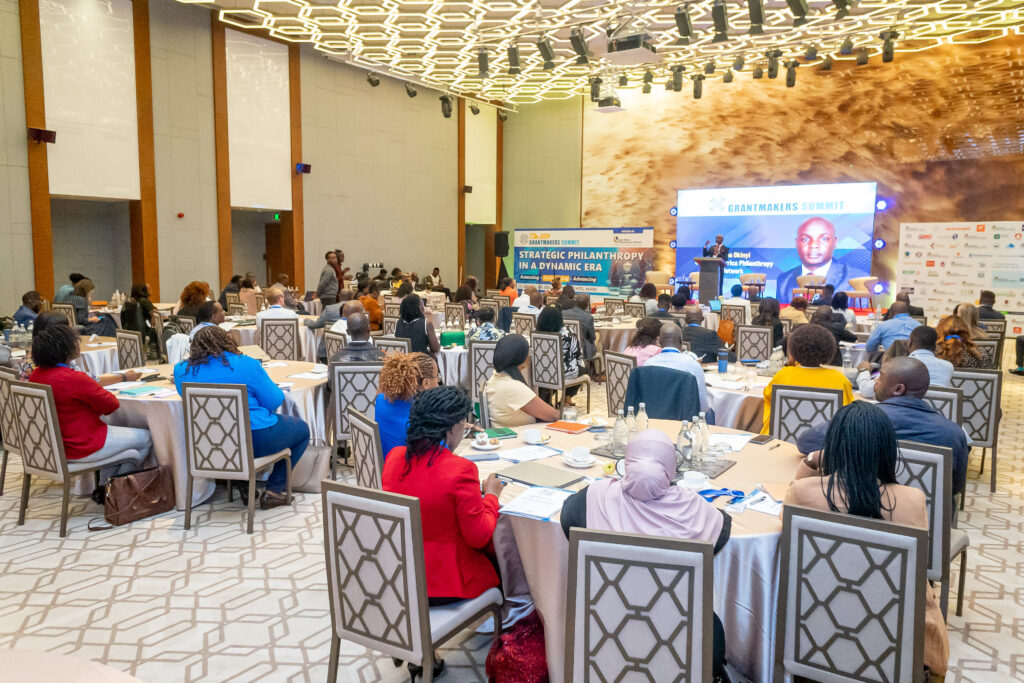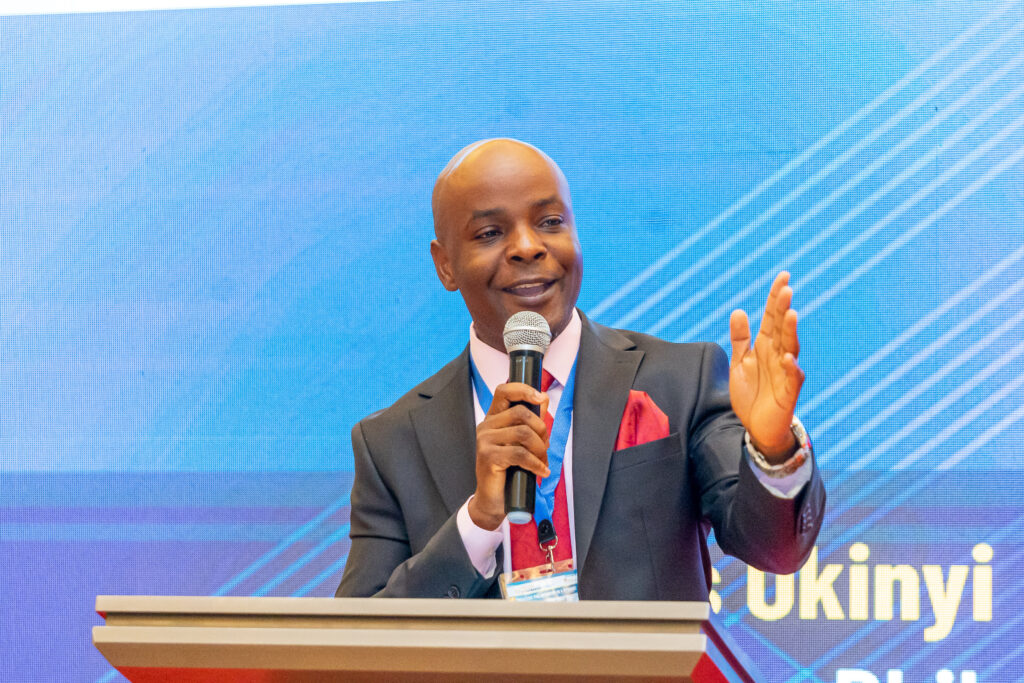News
How can those of us working in or with philanthropy respond to the complex challenges and opportunities of our times?
Last month Small Foundation joined grantmakers, social investors and impact leaders at the 2024 Grantmakers Summit in Nairobi. Evans Okinyi, CEO of the East Africa Philanthropy Network (EAPN), opened the summit with an invitation to assess, architect and advance our work with new vision and energy.
The following are Okinyi’s remarks, which Small Foundation has found useful in assessing our own work:
‘In this defining moment, and as we convene for the 2024 Grantmakers Summit, we are called to rise to the occasion with clarity, conviction, and a shared sense of purpose.
We stand at the intersection of tradition and innovation, where the future of philanthropy hinges on our ability to critically evaluate our past, reimagine our strategies, and boldly advance our collective mission.
Our discourse will be anchored on the three pillars of assessing, architecting, and advancing, each serving as a basis for a more effective, inclusive, and revolutionary grantmaking landscape.

Assessing: Evaluating our Effectiveness
I. The Necessity of Rigorous Evaluation
This exercise is not a formality but a commitment to introspection and accountability. It demands that we scrutinize our methodologies, question our assumptions, and confront the uncomfortable truths of our shortcomings. Our intentions, however noble, must be matched by outcomes that reflect real-world impact and this necessitates a systematic review of our initiatives, measuring their effectiveness against global shifts and local realities.
II. Identifying Loopholes and Shortcomings
Traditional grantmaking has often been marred by critical gaps that undermine its potential. Foremost among these is the pervasive lack of transparency, which erodes trust and fosters inefficiency. The top-down approach, wherein decisions are made in isolation from the communities we aim to serve, results in initiatives misaligned with local needs and priorities. Furthermore, the inadequacy of impact measurement mechanisms leaves us in the dark about the true efficacy of our efforts. We must acknowledge these systemic flaws with candor and resolve.
III. The Imperative of Data-Driven Insights
The path to rectification lies in embracing data-driven insights. By leveraging advanced data analytics, we gain a subtle understanding of the effectiveness of our current models. This entails collecting data and engaging in assessments that capture the lived experiences of beneficiaries. Through this holistic approach, we can identify patterns of success and failure, informing more strategic and impactful decision-making.
IV. The Call for Strategic Recalibration
The culmination of our assessment phase must be a decisive call for strategic recalibration, which is not just an adjustment of tactics but a fundamental rethinking of our approach to grantmaking. We must be willing to dismantle entrenched practices that no longer serve their purpose and embrace innovative methodologies that promise greater efficacy and impact. That requires courage, vision, and a steadfast commitment to continuous improvement.
Architecting: What We Ought to Do in Response
I. The Vision of Resilient and Adaptive Strategies
Having identified the gaps and shortcomings in our traditional practices, we must now focus on the deliberate design and structuring of resilient and adaptive strategies. The dynamic global context in which we operate demands that our frameworks be flexible and responsive to emerging challenges and opportunities. Our vision must be expansive, encompassing immediate relief efforts and long-term strategies for sustainability and systemic change. This requires a paradigm shift from reactive to proactive philanthropy, where we anticipate future needs and act with foresight and purpose.
II. Innovating Through Collaborative Ventures
Innovation in philanthropy necessitates a departure from isolated efforts and a shift toward collaborative ventures. By pooling our resources, expertise, and networks, we can amplify our impact manifold. Collaborative models foster a culture of shared learning and mutual support, enabling us to tackle complex issues more effectively. This cooperative spirit is a fundamental ethos that must permeate our work. We must seek partnerships that unite diverse stakeholders with a common purpose.
III. Integrating Sustainability, Equity, and Systemic Impact
The principles of sustainability, equity, and systemic impact must underpin the design of our strategies. Sustainability ensures that our initiatives are not transient solutions but enduring contributions to societal well-being. Equity mandates that our efforts are inclusive and just, addressing the needs of the most marginalized and vulnerable populations. Systemic impact calls for a holistic approach that addresses root causes rather than symptoms, fostering change at all levels.
IV. The Role of Best Practices and Case Studies
We must draw on rich global best practices as we architect our strategies. We can refine our approaches and avoid common pitfalls by learning from others’ successes and failures. The summit is a cooperative forum for ideating and crafting these strategic frameworks, leveraging all participants’ collective wisdom and experience.
Advancing: Sustaining Momentum and Impact
I. From Conceptual Frameworks to Actionable Plans
Advancing our initiatives requires a seamless transition from conceptual frameworks to actionable plans. It is not enough to design impactful strategies; we must also ensure their effective implementation. This entails moving beyond abstract theories to concrete actions that yield measurable and sustainable outcomes. Our plans must be precisely crafted, with clear goals, timelines, and accountability mechanisms. Translating from this vision to reality requires thorough planning, steadfast commitment, and relentless execution.
II. Strategies for Maintaining Momentum
We must remain vigilant and responsive to changing circumstances, ready to recalibrate our approaches. Effective communication and stakeholder engagement are critical to maintaining enthusiasm and support for our efforts. By fostering a culture of collaboration and shared ownership, we can ensure that our initiatives continue to thrive.
III. Achieving Measurable and Sustainable Outcomes
The ultimate measure of our success lies in our initiatives’ tangible and enduring impact. We must employ rigorous methodologies to evaluate our outcomes, ensuring they are measurable and sustainable. By setting clear metrics for success and regularly assessing our progress, we can identify areas for enhancement and celebrate our achievements.
IV. The Importance of Continuous Learning and Adaptation
Lastly, we must be open to feedback, willing to learn from our mistakes, and ready to embrace new ideas. This iterative process of learning and adaptation allows us to refine our strategies and enhance our impact over time. This requires a relentless focus on innovation, a willingness to take risks, and a commitment to unceasing excellence.
In conclusion, the 2024 Grantmakers Summit is an essential moment in our collective journey. Let us seize this opportunity to transform our sector, Thank you, and let us do this with resolve and determination.’
The largest philanthropy support organisation in the region, EAPN is a membership network of more than 110 regional and national philanthropy organisations drawn from Kenya, Rwanda, Tanzania, Ethiopia, and Uganda that work in varied sectors to contribute to revolutionary change in communities through giving that is responsive, agile, and impactful.




